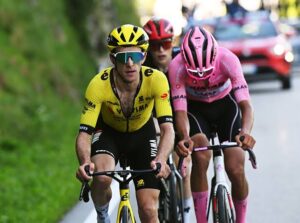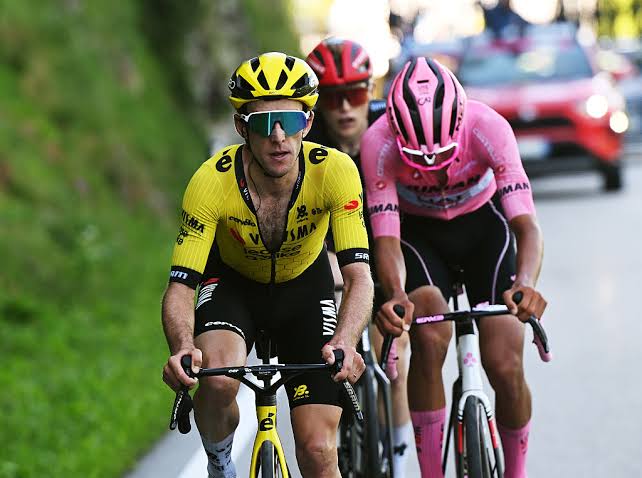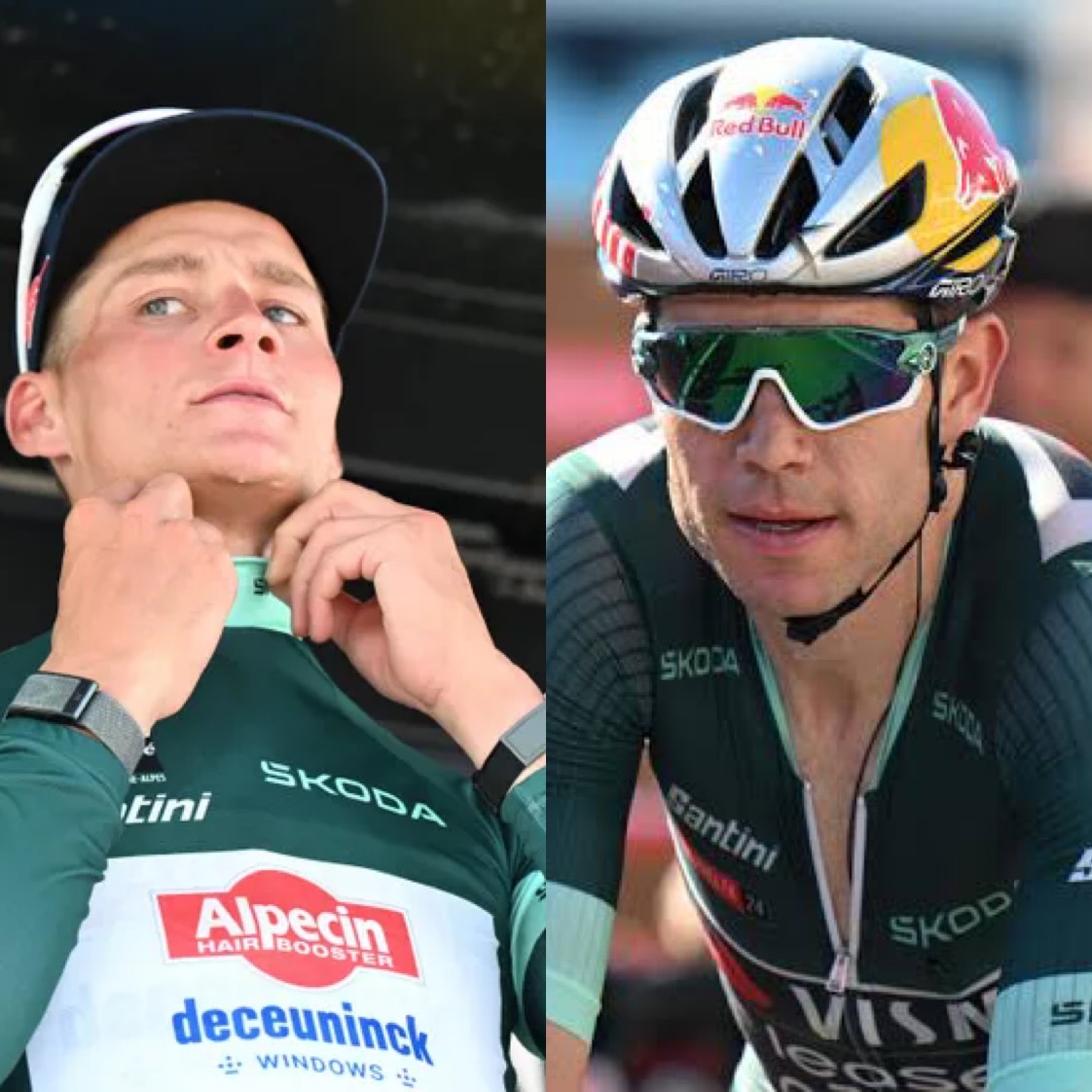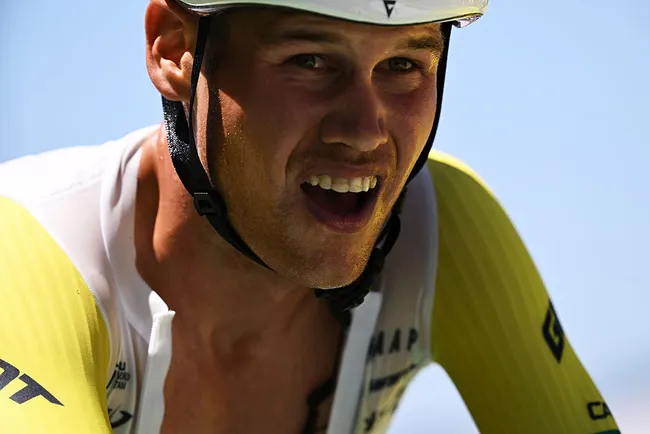**Wout van Aert Vows to Go “All In for Simon Yates” After Breakaway Disappointment on Stage 18 of the 2025 Giro d’Italia**
In the high-stakes world of professional cycling, where every second counts and strategic decisions can make or break a rider’s overall ambitions, the 2025 Giro d’Italia has once again delivered its signature blend of drama, rivalries, and unexpected twists. Among the many compelling narratives, the alliance and camaraderie between Wout van Aert and Simon Yates have captured the attention of fans and analysts alike. Following a disappointing outcome on Stage 18—a grueling mountain stage that saw a pivotal breakaway falter—van Aert has publicly vowed to dedicate himself entirely to supporting Yates in the remaining stages of the race.

*The Context of Stage 18*
Stage 18 of the 2025 Giro was a formidable test, featuring multiple ascents of legendary climbs that have historically decided the race’s outcome. The stage was characterized by aggressive attacks from GC contenders, relentless breakaways, and tactical chess matches between teams. Wout van Aert, riding for the Jumbo-Visma team, initially positioned himself as a key player in the race dynamics, often acting as a domestique or a potential attacker himself.
However, the day did not go as planned. A significant breakaway group, including Yates, managed to establish a substantial lead early on. Van Aert, working to control the peloton and set up team strategies, found himself in a supporting role rather than the aggressive rider he often is. As the stage progressed into the final kilometers, the breakaway faced mounting pressure from the peloton, and ultimately, it was caught just short of the summit finish. Yates, who had attacked earlier and shown remarkable resilience, narrowly missed out on a stage victory, and the overall standings remained largely unchanged—yet the disappointment was palpable.
*Van Aert’s Disappointment and Reflection*
The aftermath of Stage 18 was filled with introspection. Van Aert, known for his versatility and tactical acumen, expressed his frustration at the missed opportunity. “We were well-positioned, and I believed in the breakaway’s potential,” he stated in the post-stage interview. “Unfortunately, it didn’t work out today. It’s always tough when efforts don’t pay off, especially when you’re fighting for the best possible result for our team and Simon.”
His words revealed a deep sense of commitment not just to his personal ambitions but also to Yates’s quest for the overall victory. The British rider Yates, a former Giro winner and a consistent contender, had shown resilience throughout the race but had yet to secure a decisive advantage over his rivals. With only a handful of stages remaining, the stakes were high, and the support of van Aert could prove pivotal.
*The “All In” Commitment*
In the immediate aftermath, van Aert made a public declaration that signaled a shift in his approach. “After today’s setback, I’m going ‘all in’ for Simon,” he proclaimed. “My focus now is to support him in every way possible—whether that means controlling the peloton, launching attacks at the right moments, or simply being at his service. I believe in his ability, and I want to give him the best chance to win this Giro.”
This statement was more than just words; it was a strategic commitment. Van Aert, renowned for his all-around capabilities—climbing, sprinting, and time-trialling—was offering to dedicate his remaining energy and tactics solely to aid Yates. Such a move underscores the team-oriented mentality that often characterizes Grand Tour racing, where individual glory is intertwined with team success.
*Strategic Implications*
Van Aert’s vow to support Yates has significant implications for the race’s final stages. It signals a possible change in team tactics, with Jumbo-Visma shifting from a balanced approach to a more aggressive, support-oriented strategy centered around Yates. This could involve:
– **Controlling the race pace** to prevent rivals from gaining time on Yates during mountain stages.
– **Launching attacks** at strategic moments to force rivals into defending, thereby giving Yates opportunities to respond or counterattack.
– **Protecting Yates** from attacks on key climbs, ensuring he remains within striking distance of the lead.
– **Creating opportunities** for Yates to attack or gain time during descents or transitional phases.
Such tactics demand a high level of coordination and selflessness from Van Aert, who is capable of both supporting and attacking himself. His commitment to Yates also reflects a strong team dynamic, where the collective effort is prioritized over individual ambitions.
*Historical Parallels and Significance*
Van Aert’s stance echoes historical examples of riders prioritizing team leaders in Grand Tours, often sacrificing personal chances to secure overall victory for their captains. His decision demonstrates leadership and a strategic mindset that could influence the race’s outcome significantly.
Moreover, this alliance underscores the importance of camaraderie and shared purpose in professional cycling. While individual glory often dominates headlines, the true essence of Grand Tour racing lies in team effort, tactical finesse, and shared resilience.
*The Race Remaining*
With only a few stages left, including the challenging mountain finishes and the decisive individual time trial, the Giro d’Italia 2025 remains wide open. Yates holds a narrow lead, but rivals such as Primož Roglič, Geraint Thomas, and João Almeida continue to threaten his position.
Van Aert’s vow to “go all in” for Yates could be the decisive factor in the race’s final chapters. If his support proves effective, Yates might find the strength and strategic advantage needed to secure his second Giro crown. Conversely, if the race dynamics favor other contenders, Van Aert’s dedication will still exemplify the spirit of team loyalty and tactical intelligence that defines the sport.
Wout van Aert’s pledge to dedicate himself fully to Simon Yates after the disappointment on Stage 18 of the 2025 Giro d’Italia highlights the complex interplay of individual effort and team strategy in Grand Tour racing. His willingness to “go all in” not only reflects his commitment to his teammate but also signals a potential turning point in the race’s final stages. As the peloton prepares for the concluding battles, all eyes will be on how Van Aert’s support influences the outcome—testament to the enduring drama, camaraderie, and strategic brilliance that make the Giro one of cycling’s greatest spectacles.



